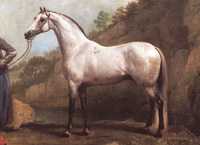Alcock's Arabian
| Alcock's Arabian | |
|---|---|
|
Alcock's Arabian | |
| Breed | Thoroughbred |
| Sire | Curwen's Bay Barb |
| Dam | Old Wen Mare (Sister to Clumsey) |
| Damsire | Hautboy |
| Sex | Stallion |
| Foaled | c1707 |
| Country | GB |
| Colour | Grey |
| Breeder | Sir J. Parsons |
| Owner | Mr Alcock/Mr Charles Pelham |
| Awards | |
| Champion sire in Great Britain and Ireland (1728) | |
Alcock's Arabian (foaled c1707, died c1733, also known as Pelham Grey Arabian and possibly Bloody Buttocks and Ancaster Turk among others, was said to have been imported into the Kingdom of England early in the 18th century. However, there is no firm evidence to support this assertion. There is, however, strong evidence that he was a son of Curwen's Bay Barb out of Old Wen Mare (Sister to Clumsey).[1] The Old Wen Mare was either full sister or possibly the same mare as the exceptional broodmare Grey Wilkes.
Volume 1 of the fifth edition of the General Stud Book lists Sir W. Wynn's Spot - a horse accepted to have been sired by Alcock's Arabian, as: "...by a son of the Curwen Bay Barb (which was out of Sir J. Parsons's Old Wen Mare, sister to Clumsey)..."
Alcock's Arabian is the ancestor of all grey Thoroughbred horses.[2] as well as grey sports and riding horses descended from thoroughbred lines.
Origins
It is said that Sir Robert Sutton (1671–1746), English ambassador to the Ottoman Empire in Constantinople from 1700 to 1717, acquired horses in Constantinople, including Alcock's Arabian the Holderness Turk and the Brownlow Turk and had them shipped to England in 1704. However, there is no evidence that Alcock's Arabian was among these horses[3] and it is more likely that he was bred in England. Lady Wentworth researched the foundation sires and found some confusion due to horses' names changing as they changed owners. She eventually concluded that pretty much every imported grey stallion was the same horse as Alcock's Arabian. While it is true that he may have been known under several different names (Pelham's Grey Horse, Bloody Buttocks, for examples) he could not have been the same horse as those that were imported, because he was almost certainly bred in England.
Bloodlines and influence
The horse's sire line was significant through his son Crab (or "Old Crab"), who sired Ancaster's Grasshopper, Routh's Crab, Shepherd's Crab, Cumberland's Crab, Sloe, Rib, Wynn's Spot, Gentleman, Brilliant, Black and All Black, Imported Sober John, Berie's Ramper, and Spectator. The last of these was the sire of Sulphur, Damper, and Marc Anthony, who sired Aimwell (1782), winner of the Derby of 1785. Aimwell was the only winner of the Derby not in the sire line of one of the three great Arabian foundation stallions, the Godolphin Arabian, the Darley Arabian, and the Byerley Turk.[4][5]
Although his sire line is believed now to be extinct among Thoroughbreds, Alcock's Arabian is considered the ancestor of all grey Thoroughbred horses.[2][6] His status as the progenitor of all grey Thoroughbreds was the subject of a question on Episode 12 of Series H of the BBC comedy panel game QI.[7]
Notes
- ↑ The General Stud Book vol. 1 fifth edition
- ↑ 2.0 2.1 Lady Wentworth, The Swift Runner: racing speed through the ages (G. Allen & Unwin, 1957), p. 27: "All grey thoroughbreds are descended in direct (though not exclusively male) line from the Grey Alcock Arabian, also known as the Brownlow Turk, Honeywood Arabian and Akaster Turk, the grey colour persisting through some 26 generations..."
- ↑ Prior, C. M (1926). History of the Racing Calendar and Studbook.
- ↑ The Athenaeum, part 2, p. 380: "One other Arabian there was which in the direct male line was the progenitor of one solitary winner of the Derby ; that was Mr. Alcock's Arabian, sire of Old Crab, sire of Spectator, sire of Marc Antony, sire of Aimwell, winner of the Derby in 1785."
- ↑ Nicholas Hankey Smith, 'Thoroughbred Bloodlines', in Observations on Breeding for the Turf (London: G. Whittaker, 1825), pp. 100 & 236-237
- ↑ Elwyn Hartley Edwards, Candida Geddes, The Complete horse book (1991), p. 67: "...every grey Thoroughbred traces back to Alcock's Arabian."
- ↑ "QI - Series H - Horses And Hunting - British Comedy Guide". Comedy.co.uk. Retrieved 2012-02-18.
